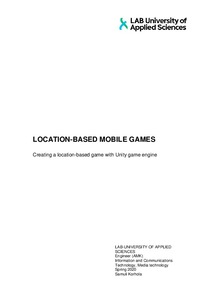Innovating Ethical Monetization for Profitable and Engaging Games
Dastakeer, Imam (2024)
Dastakeer, Imam
2024
All rights reserved. This publication is copyrighted. You may download, display and print it for Your own personal use. Commercial use is prohibited.
Julkaisun pysyvä osoite on
https://urn.fi/URN:NBN:fi:amk-2024101426431
https://urn.fi/URN:NBN:fi:amk-2024101426431
Tiivistelmä
Lately we have been seeing a trend of successful gaming companies shutting down within the video game industry at a rapid pace. The current state of the video game industry is quite unsustainable due to outdated and questionable monetization strategies being used by many companies. The benefits of loot boxes and microtransactions come with a cost of unsatisfied gamers, as well as concerns with fairness and openness, in gaming practices. The aim of this research study is to explore the existing monetization strategies and develop a game monetization framework that gives more importance to ethical principles and fairness and explores the potential of using AI technologies to enhance the overall gaming experience for modern gaming audience while ensuring long-team success for the gaming companies with successful game launches.
When designing the research method, a mix of Constructive Research and Case Study Research methods were used to study the current monetization strategies in the video game sector by utilizing both qualitative data, such as online surveys, and analysing various literature to gain a deeper insight into the challenges and possible solutions while establishing a stronger framework. One online survey was designed to gather input from players for the framework creation and second survey was directed at industry professionals to validate the framework.
The results showed a clear dissatisfaction among players with current monetization methods, such as pay-to-win models, as they view them as exploitative. The respondents prefer cosmetic only microtransactions that do not affect gameplay progression. There were some concerns about the AI-driven personalization, as they see a potential of prioritizing profits over player experience. Although results show that AI integration could enhance monetization, it must be carefully man-aged with regular audits to prevent exploitation. The industry professionals provided positive feedback on the proposed framework, with several areas of improvements. Key feedback includes relying on real-time player feedback may not fully capture the preferences of larger player base and unnecessary transparency would reduce the appeal for some players, and the dynamic pricing could unintentionally exploit loyal players through manipulation. However, they also acknowledged that, if done correctly, these elements could still provide benefits. A few professionals stated that Pay-to-Win models may be acceptable in certain conditions.
The findings make it clear that the gaming industry needs to shift toward more ethical, player-centric, and more balanced monetization approaches. Maintaining player trust and protecting consumers from exploitative practices require strict adherence to regulatory standards and ethical business practices within gaming companies. This framework provides clear guidelines for regular AI audits, maintaining pricing transparency, and incorporating ongoing player feedback for continuous improvement. Ultimately, this framework provides a long-term solution that balances player experience with the long-term success of gaming companies.
When designing the research method, a mix of Constructive Research and Case Study Research methods were used to study the current monetization strategies in the video game sector by utilizing both qualitative data, such as online surveys, and analysing various literature to gain a deeper insight into the challenges and possible solutions while establishing a stronger framework. One online survey was designed to gather input from players for the framework creation and second survey was directed at industry professionals to validate the framework.
The results showed a clear dissatisfaction among players with current monetization methods, such as pay-to-win models, as they view them as exploitative. The respondents prefer cosmetic only microtransactions that do not affect gameplay progression. There were some concerns about the AI-driven personalization, as they see a potential of prioritizing profits over player experience. Although results show that AI integration could enhance monetization, it must be carefully man-aged with regular audits to prevent exploitation. The industry professionals provided positive feedback on the proposed framework, with several areas of improvements. Key feedback includes relying on real-time player feedback may not fully capture the preferences of larger player base and unnecessary transparency would reduce the appeal for some players, and the dynamic pricing could unintentionally exploit loyal players through manipulation. However, they also acknowledged that, if done correctly, these elements could still provide benefits. A few professionals stated that Pay-to-Win models may be acceptable in certain conditions.
The findings make it clear that the gaming industry needs to shift toward more ethical, player-centric, and more balanced monetization approaches. Maintaining player trust and protecting consumers from exploitative practices require strict adherence to regulatory standards and ethical business practices within gaming companies. This framework provides clear guidelines for regular AI audits, maintaining pricing transparency, and incorporating ongoing player feedback for continuous improvement. Ultimately, this framework provides a long-term solution that balances player experience with the long-term success of gaming companies.
Kokoelmat
Samankaltainen aineisto
Näytetään aineisto, joilla on samankaltaisia nimekkeitä, tekijöitä tai asiasanoja.
-
Game Development in Unity : Game Production, Game Mechanics and the Effects of Gaming
Dansie, Jason (Metropolia Ammattikorkeakoulu, 2013)The goal of this thesis is to examine how video games are designed and to see how differ-ent game mechanics work and how to use them in the development of a game, as well as examine what are both the positive and negative ... -
Location-based mobile games : creating a location-based game with the Unity game engine
Korhola, Samuli (2020)The subject of this thesis is location-based mobile games. Location-based mobile games are a way for mobile games to combine reality with virtual worlds and thus re-define the gaming experience. This thesis presents ... -
”WE WANT A 3D GAME” : Customer expectations for the games company when buying a serious game
Sorppanen, Mikko (Oulun seudun ammattikorkeakoulu, 2012)All digital games are not used for entertainment. Some of them can also be used for non-entertainment purposes and these games are called serious games. This thesis is carried out in co-operation with one Finnish games ...



